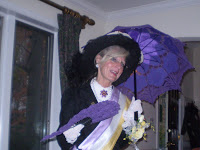History commissioner brings life to suffragist hero

“Mr. President, how long must women wait for liberty?” These words were hung on banners at the gates of the White House as women marched to demand the right to vote in 1917.
These words also began Lynne Garvey-Hodge’s re-enactment of suffragist Mrs. Robert Walker at a presentation at the home of Marie Reinsdorf in Falls Church Sunday afternoon. Garvey-Hodge, a member of the Fairfax County History Commission, wore a long black dress with a purple, white and yellow sash—standing for loyalty, purity, and “the light in all of us”—like those worn by the suffragists.
The event was a fundraiser for the Turning Point Suffragist Memorial at the Occoquan Regional Park, which honors the brave women who were jailed at the Occoquan Workhouse, then part of the Lorton Prison complex, in response to their demands to give women the right to vote.
Mrs. Robert Walker, a wealthy Quaker who had graduated from Swarthmore, was among 10,000 women who marched along Pennsylvania Avenue during the inauguration of President Woodrow Wilson. The protests went on for months, as the women reminded Wilson of his efforts to bring democracy to Europe and demanded democracy for the women of America. During her years of activism, “I was considered a terrorist and a threat to the government,” Garvey-Hodge said, in her role as Mrs. Walker.
Walker was one of 123 suffragists arrested in front of the White House for disrupting traffic during the summer of 1917. They were incarcerated at the Occoquan Workhouse, where they were given coarse, ill-fitting clothes and shoes, worm-ridden food, and undrinkable water. They were also beaten up and confined in straitjackets. “Wilson wanted us declared crazy,” Walker said. She was released after 60 days and continued her protests at the White House.
The publicity surrounding the harsh treatment of those women at the Occoquan Workhouse became a turning point in the struggle for equality. The 19th Amendment, giving women the vote, was finally passed on Aug. 26, 1920. The goal is to have the Turning Point memorial completed by the 100th anniversary of the 19th Amendment in 2020.

